 | TODAY IN SCIENCE HISTORY
NEWSLETTER - 19 DECEMBER |
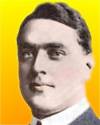 On 19 Dec 1933, Herbert Thacker Herr died, a U.S. mechanical engineer who advanced the design of steam turbines with simplifications, increased capacity and improved methods of manufacturing. Early in his career as a machinist and draftsman for a railroad, he invented a braking control for trains having several locomotives (1904) and a mechanism to regulate braking power according to the weight of the car. By 1908, he was vice president and general manager of the Westinghouse Machine Company. In developing steam turbines (1913), he brought together elements of the highly efficient Parsons system with elements of the lighter Curtis- Rateau impulse system. He also pioneered in propulsion of marine vessels, and remote-control to operate a ship's engine from the bridge (1916). A short biography of Herbert Thacker Herr includes a few more highlights of his productive career. On 19 Dec 1933, Herbert Thacker Herr died, a U.S. mechanical engineer who advanced the design of steam turbines with simplifications, increased capacity and improved methods of manufacturing. Early in his career as a machinist and draftsman for a railroad, he invented a braking control for trains having several locomotives (1904) and a mechanism to regulate braking power according to the weight of the car. By 1908, he was vice president and general manager of the Westinghouse Machine Company. In developing steam turbines (1913), he brought together elements of the highly efficient Parsons system with elements of the lighter Curtis- Rateau impulse system. He also pioneered in propulsion of marine vessels, and remote-control to operate a ship's engine from the bridge (1916). A short biography of Herbert Thacker Herr includes a few more highlights of his productive career. |
 On 19 Dec 1944, Richard Leakey was born, Kenyan anthropologist and paleontologist, who was a son of noted anthropologists Louis and Mary Leakey. Today's Science Store pick is: Origins Reconsidered: In Search of What Makes Us Human, by Richard E. Leakey who relates an intellectual odyssey, describing his discoveries of human origins and his reflections on the nature of humanity. Where necessary, anthropological terms and theories are fully explained. Neither his explorations of human origins nor his quest to save African wildlife were stopped by years of kidney failure, near-fatal pneumonia, death threats from poachers, or even the loss of his legs in a plane crash. Leakey presents detailed science with a flair of immediacy often missing from the academic literature. It is available New from $6.15. Used from $0.01. (As of time of writing.). On 19 Dec 1944, Richard Leakey was born, Kenyan anthropologist and paleontologist, who was a son of noted anthropologists Louis and Mary Leakey. Today's Science Store pick is: Origins Reconsidered: In Search of What Makes Us Human, by Richard E. Leakey who relates an intellectual odyssey, describing his discoveries of human origins and his reflections on the nature of humanity. Where necessary, anthropological terms and theories are fully explained. Neither his explorations of human origins nor his quest to save African wildlife were stopped by years of kidney failure, near-fatal pneumonia, death threats from poachers, or even the loss of his legs in a plane crash. Leakey presents detailed science with a flair of immediacy often missing from the academic literature. It is available New from $6.15. Used from $0.01. (As of time of writing.). | | For picks from earlier newsletters, see the Today in Science History Science Store home page. | |
 | We are now witnessing, after the slow fermentation of fifty years, a concentration of technical power aimed at the essential determinants of heredity, development and disease. This concentration is made possible by the common function of nucleic acids as the molecular midwife of all reproductive particles. Indeed it is the nucleic acids which, in spite of their chemical obscurity, are giving to biology a unity which has so far been lacking, a chemical unity. - Cyril Dean Darlington, English botanist and geneticist (born 19 Dec 1903).  |
 | A fossil hunter needs sharp eyes and a keen search image, a mental template that subconsciously evaluates everything he sees in his search for telltale clues. A kind of mental radar works even if he isn't concentrating hard. A fossil mollusk expert has a mollusk search image. A fossil antelope expert has an antelope search image. ... Yet even when one has a good internal radar, the search is incredibly more difficult than it sounds. Not only are fossils often the same color as the rocks among which they are found, so they blend in with the background; they are also usually broken into odd-shaped fragments. ... In our business, we don't expect to find a whole skull lying on the surface staring up at us. The typical find is a small piece of petrified bone. The fossil hunter's search therefore has to have an infinite number of dimensions, matching every conceivable angle of every shape of fragment of every bone on the human body.
Describing the skill of his co-worker, Kamoya Kimeu, who discovered the Turkana Boy, the most complete specimen of Homo erectus, on a slope covered with black lava pebbles. - Richard E. Leakey, Kenyan paleontologist and physical anthropologist (born 19 Dec 1944).  |
 | Why did I decide to undertake my doctorate research in the exotic field of boron hydrides? As it happened, my girl friend, Sarah Baylen, soon to become my wife, presented me with a graduation gift, Alfred Stock's book, The Hydrides of Boron and Silicon. I read this book and became interested in the subject. How did it happen that she selected this particular book? This was the time of the Depression. None of us had much money. It appears she selected as her gift the most economical chemistry book ($2.06) available in the University of Chicago bookstore. Such are the developments that can shape a career. - Herbert C. Brown, English-American chemist (died 19 Dec 2004).  |
| Before you look at today's web page, see if you can answer some of these questions about the events that happened on this day. Some of the names are very familiar. Others will likely stump you. Tickle your curiosity with these questions, then check your answers on today's web page. |
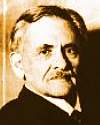 | A.A. Michelson, born 19 Dec 1852, was a German-born American physicist who is best known for establishing a certain physical quantity as a fundamental constant.
 Can you name this fundamental constant? |
 | On 19 Dec 1944, Richard E. Leakey was born, the second of three sons of noted anthropologists Louis Leakey and Mary Leakey, and eventually followed with his own career in anthropology and paleontology. He has been responsible for extensive fossil finds of human ancestral forms.
 Where in the world did Richard Leakey do his anthropological work? |
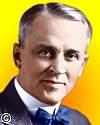 | An American physicist (1868-1953) measured the charge of single electrons with his famous oil-drop experiment in 1911.
 Can you name this scientist? |
 | A German psychiatrist (1864-1915), in Nov 1901, examined a 51-year-old patient with signs of dementia who had been admitted to the hospital where he worked. In 1906, he gave a lecture describing “a peculiar disorder of the cerebral cortex.” Since then, the presenile dementia has been named after this doctor, who was the first to recognize it.
 What is the name of the doctor and the disease? |
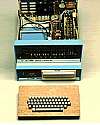 | On 19 Dec 1974, the pioneering Altair microcomputer was first put on sale in the U.S. as a do-it-yourself computer kit, for $397. It used switches for input and flashing lights as a display. It was featured on the cover of the Jan 1975 issue of Popular Electronics.
 Which microprocessor was used in this product? |
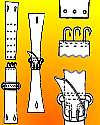 | On 19 Dec 1871, Samuel Clemens (a.k.a. Mark Twain) received a patent for “an improvement in adjustable and detachable garment straps.” He later filed a patent for “Mark Twain's Self-Pasting Scrapbook” (1873), and another for an educational game (1885) that helped players remember important historical dates.
 What would now be the common name for his “garment straps” he patented? |
When you have your answers ready to all the questions above, you'll find all the information to check them, and more, on the December 19 web page of Today in Science History. Or, try this link first for just the brief answers.
Fast answers for the previous newsletter for December 18: corpuscles • frequency modulation (FM) for the radio signal, with improved sound quality • between the Earth's crust and mantle • “terrible reptile” • Moon • Piltdown Man. |
 If you enjoy this newsletter, the website, or wish to offer encouragement or ideas, please send feedback by using your mail reader Reply button. If you enjoy this newsletter, the website, or wish to offer encouragement or ideas, please send feedback by using your mail reader Reply button.
Your click on a StumbleUpon, Google+ or Facebook social button on the site webpages is also a welcome sign of appreciation. Thank you for using them. |
To find citations for quotations go to the corresponding webpage by clicking on the “quotes” balloon icon. Sources for the thumbnails appear on today's webpage with the corresponding item.
� This newsletter is copyright 2013 by todayinsci.com. Please respect the Webmaster's wishes and do not put copies online of the Newsletter � or any Today in Science History webpage. (If you already have done so, please remove them. Thank you.) Offline use in education is encouraged such as a printout on a bulletin board, or projected for classroom viewing. Online, descriptive links to our pages are welcomed, as these will provide a reader with the most recent revisions, additions and/or corrections of a webpage. For any other copyright questions, please contact the Webmaster by using your mail reader Reply button. |
--
If you do not want to receive any more newsletters,
Unsubscribe To update your preferences and to unsubscribe visit
this link 


 On 19 Dec 1933, Herbert Thacker Herr died, a U.S. mechanical engineer who advanced the design of steam turbines with simplifications, increased capacity and improved methods of manufacturing. Early in his career as a machinist and draftsman for a railroad, he invented a braking control for trains having several locomotives (1904) and a mechanism to regulate braking power according to the weight of the car. By 1908, he was vice president and general manager of the Westinghouse Machine Company. In developing steam turbines (1913), he brought together elements of the highly efficient Parsons system with elements of the lighter Curtis- Rateau impulse system. He also pioneered in propulsion of marine vessels, and remote-control to operate a ship's engine from the bridge (1916). A short biography of Herbert Thacker Herr includes a few more highlights of his productive career.
On 19 Dec 1933, Herbert Thacker Herr died, a U.S. mechanical engineer who advanced the design of steam turbines with simplifications, increased capacity and improved methods of manufacturing. Early in his career as a machinist and draftsman for a railroad, he invented a braking control for trains having several locomotives (1904) and a mechanism to regulate braking power according to the weight of the car. By 1908, he was vice president and general manager of the Westinghouse Machine Company. In developing steam turbines (1913), he brought together elements of the highly efficient Parsons system with elements of the lighter Curtis- Rateau impulse system. He also pioneered in propulsion of marine vessels, and remote-control to operate a ship's engine from the bridge (1916). A short biography of Herbert Thacker Herr includes a few more highlights of his productive career. 



 Can you name this fundamental constant?
Can you name this fundamental constant? 
 Where in the world did Richard Leakey do his anthropological work?
Where in the world did Richard Leakey do his anthropological work? 
 Can you name this scientist?
Can you name this scientist? 
 What is the name of the doctor and the disease?
What is the name of the doctor and the disease? 
 Which microprocessor was used in this product?
Which microprocessor was used in this product? 
 What would now be the common name for his “garment straps” he patented?
What would now be the common name for his “garment straps” he patented?  If you enjoy this newsletter, the website, or wish to offer encouragement or ideas, please send feedback by using your mail reader Reply button.
If you enjoy this newsletter, the website, or wish to offer encouragement or ideas, please send feedback by using your mail reader Reply button. 

Δεν υπάρχουν σχόλια:
Δημοσίευση σχολίου